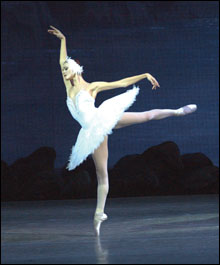
EYE OF THE STORM: Uliana Lopatkina as Odette.
|
Swan Lake is ballet’s ultimate act of yearning. For just an instant, that opening F-sharp from the oboe hovers, between B major and B minor, flock and flight, castle and forest, sex and love, black and white. It’s a ballet for women who aren’t quite women and for men who kill the thing they love. Like Béla Bartók’s opera Duke Bluebeard’s Castle, which the BSO performed last night at Symphony Hall, it has a lake of tears, and like Bluebeard it’s music in a maze, with a protagonist poised between world and dream. Bartók maintains the mystery, and the agony, to the very end (the last word in the opera is “darkness”), Judith stranded between dream and nightmare. Tchaikovsky tries for glory, turning minor into major as Siegfried overcomes Rothbart, but it’s a mirage, like the end of his Fifth Symphony a decade later. The challenge for the dancers is to keep the tears flowing, to keep the lake from freezing over and a wedding party from processing over it.
The Swan Lake that the Kirov Ballet and Orchestra have brought to the Wang Theatre this weekend is in essence the one they presented at Lincoln Center in July of 2002. It’s shaped, like the Boston Ballet edition of the 1990s, by former Kirov artistic director Konstantin Sergeyev, but where Boston’s Swan Lake was fairy-tale kaleidoscopic and comforting, the Kirov’s is muted, autumnal, the huge orange-leaved birches of the first act love going up in flames. The park in front of his mother’s castle, where Siegfried is celebrating his birthday, is the point of his initial breakout; acts two and four offer the forest as crypt, the freedom of Juliet’s tomb. Siegfried has his Jester (dropped from the 2004 Boston production), the Falstaff to his Prince Hal, a stay against nubile princesses but not against swans; when he runs off into the forest at the end of act one and act three, the Jester can’t follow. Still, they’re birds of a feather, Siegfried in his black doublet and white tights, the Jester halved in black and white. For the last two acts, Siegfried is all-white against Odile’s world black and Odette’s dream white; Odile might as well be Antonina Milyukova, the woman with whom Tchaikovsky entered into what he imagined would be a “white marriage” in 1877, just months after Swan Lake’s premiere.
The opening-night Odette/Odile and Siegfried (they’ll dance again on Sunday) were Uliana Lopatkina, last seen here in 2003 with the Kirov as a firebird of a Sheherazade, and Igor Zelensky, who at age 19 guested as Siegfried opposite Carla Stallings in the 1992 Boston Ballet Swan Lake. He remains a recessive, almost monastic, prince, more Hamlet than Hal, blond verging on bland. At the park he’s a fish out of water, his eyes barely kindling when he sees the crossbow his mother is giving him; he knows it’s the key to his destiny, he just doesn’t know how. Only when he arrives at Swan Lake does he realize that crossbows can’t unlock croisés, and from that point on he and Lopatkina move as in a dream, filling out conductor Mikhail Sinkevich’s adagissimo tempo as if it were a pillow they were stuffing with down. But he’s too white for Lopatkina’s Odile; that and his very modest variation (notable only for the kinetic kick of his forward leg in his manège) knock the stuffing out of the third act, and his containment continues to test her in the fourth.
Lopatkina, who emerged as a Kirov star in 1995, is an eye-of-the-storm Odette, all calm convent center, her connection with Siegfried beyond love or passion, a communion of souls that she signals with rapt arms, a back attitude that she must have started practicing in the womb, and a catlike self-possession; she saves her agitation for Rothbart, and even then she’s serene in Siegfried’s spell. Her Odile is simply Odette with sex, Eve with the apple, but Zelensky doesn’t bite, and since unlike many Odiles Lopatkina doesn’t play to the audience, she has no audience. Her fouettés suffer, lagging; her final diagonal run toward Siegfried goes nowhere. The act-ending hysteria is all in the orchestra; there’s nothing happening on stage.
When I saw Andrey Ivanov’s Jester in New York, I noted only his inhumanly fast tours à la seconde; he seemed to have no wit and only modest jumps. Here he’s Siegfried’s frat-boy alter ego, with a healthy interest in both books and girls: the fool as prince, and why not? The tours remain inhuman, the jumps modest. Rothbart, like the Jester, is designed not to obtrude on the principals and the corps; Ilya Kuznetsov has almost nothing to do, but he’d look better doing it in basic black (Siegfried’s id?) than in his bizarre owl outfit. Irina Golub, Ekaterina Osmolkina, and Anton Korsakov were the leggy trio who made up the first-act pas de trois last night, Golub putting exclamation points all over her pointe work. The female corps are darting salmon and blushing roses in the first act, milkweed soft and swift in the pas emboîté and arabesque sautés of their swan entrance in the second, a template for Boston Ballet beyond even what the Royal presented here in its 2001 Swan Lake.
And the ending is so close to being right. Lopatkina is beyond reproach: Siegfried is married to Odile and Odette to Rothbart, and they could be an adulterous couple (thus the black swans that thread their way through the white ones), but this is no Anna Karenina. Still, together, even with the black mark against Siegfried, they’re more enchanting than Rothbart; he’s failing, dance is triumphing, B major seems earned, inevitable . . . and then Siegfried snaps off Rothbart’s wing and he goes into WWE death spasms. It’s a primitive ending for a polyvalent ballet. If the city of white nights can’t believe in white magic, who can?